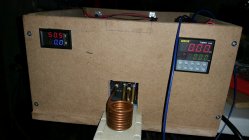I don't care what Ken Light says it's wrong. There are ten's of accurate sources that state stress relieving and annealing temperatures. 482F is in slightly below the stress relieving temp range not the annealing range.
Data from sellers of copper and brass sheet, plate and wire.
Source:
http://www.totalmateria.com/Article25.htm
Stress Relieving (not annealing)
Stress relieving is aimed to reduce or eliminate residual stress, thereby reducing the likelihood that the part will fail by cracking or corrosion fatigue in service. Parts are stress-relieved at temperatures below the normal annealing range that do not cause recrystallization and consequent softening of the metal.
Residual stresses contribute to this type of failure, which is frequently seen in brasses containing 15% zinc or more. Even higher-copper alloys such as aluminum bronzes and silicon bronzes may crack under critical combinations of stress and specific corroding, and all copper alloys are susceptible to more rapid corrosion attack when in the stressed condition.
Stressed phosphor bronzes and copper nickels have comparatively slight tendencies toward stress-corrosion cracking; these alloys are more susceptible to fire cracking, which is cracking caused when stressed metal is heated too rapidly to the annealing temperature. Slow heating provides a measure of stress relief and minimizes non-uniform temperature distributions, which lead to thermal stress.
Using a high stress-relieving temperature for a short time is generally considered best for keeping processing time and cost to a practical minimum, even though there is usually some sacrifice in mechanical properties. Using a lower temperature for a longer time will provide complete stress relief with no decrease in mechanical properties. Actually, the hardness and strength of severely cold worked alloys will increase slightly when low stress-relieving temperatures are used.
SOURCE:
http://www.lfa-wire.com/70-30-brass-wire_c26000.htm
PHYSICAL PROPERTIES
C26000, 70/30 BRASS
Annealing Temperature
800-1400°F
425-750°C
Stress Relief Temperature
(1 hr)
500°F
260°C












